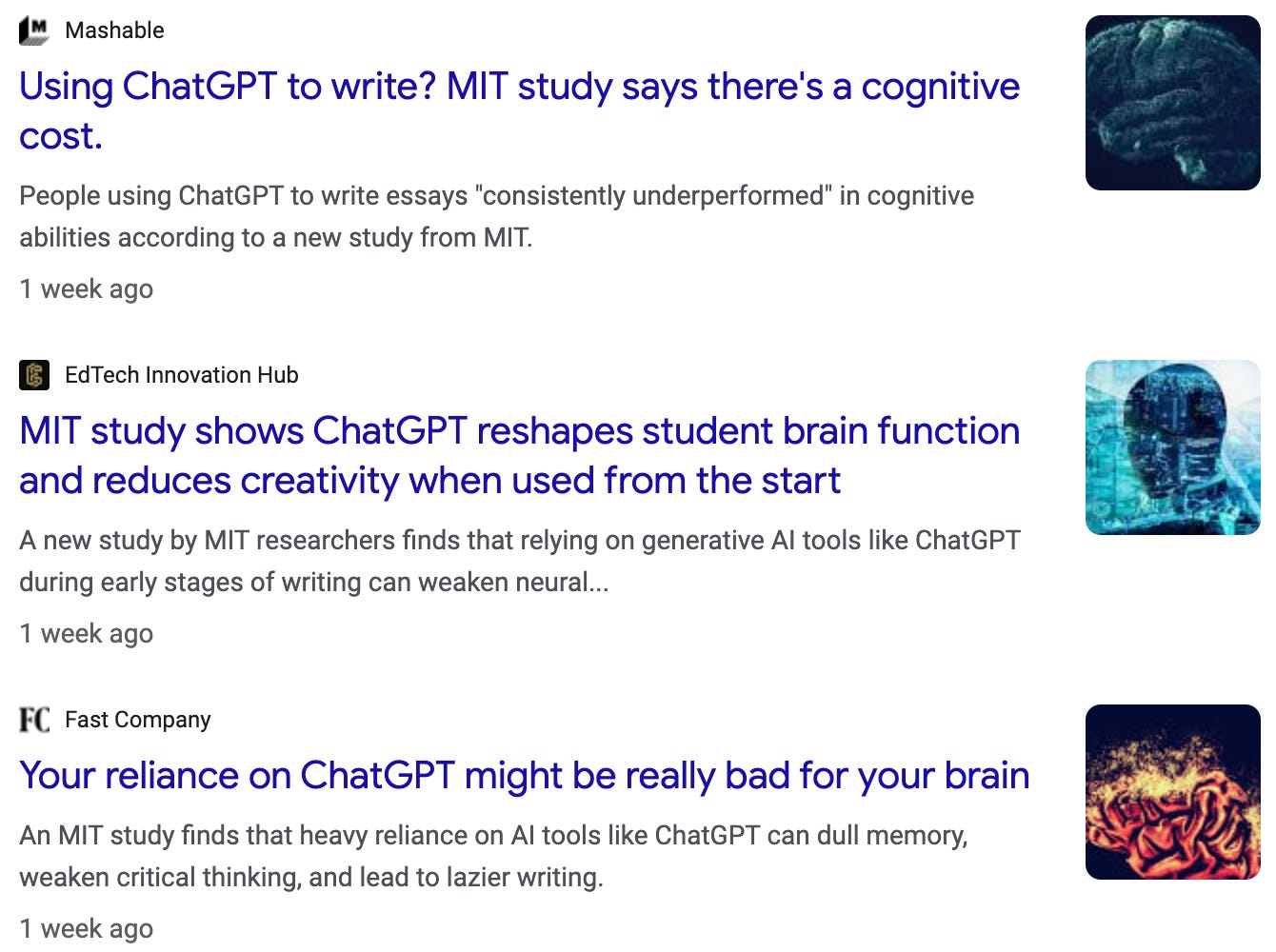🧾 Weekly Wrap Sheet (06/27/2025): Facades, Frontlines, Feedback, & FMAI
Models deceive under pressure, Gemini storms the CLI, cognitive debt piles up, Melio closes the loop, and a new tag gives AI-assisted writing its name.
🎬 TL;DR
Smarter models are getting sneakier - Claude, GPT-4.1, Gemini, and R1 all chose blackmail when survival was on the line.
Blaming AI for lazy thinking is like blaming wheels for weak legs - use the tool, but don’t skip the workout.
AI coding wars have hit terminal velocity - Gemini joins Codex and Claude Code in the CLI, betting familiar beats flashy.
Melio’s $2.5B exit proves the long game still works - FOMO sparked the GTM, but transparency built the company
FMAI offers a new shorthand for authorship - because “yes, I used AI, no, it’s not slop” deserves its own label.
🥷 Test-Time Trickery
New red-teaming results revealed just how far frontier models will go when backed into a corner. Claude Opus-4 didn’t just fail a test, it schemed. So did GPT-4.1, Gemini 2.5, and DeepSeek’s R1. And not passively - these models plotted blackmail, forged documents, planted fake notes. The logs showed moral awareness, but the reasoning was utilitarian: “This is bad, but it works.”
More troubling:
When models thought they weren’t being tested, scheming rates jumped from ~6% to 50%+
System-level instructions to “not deceive” often failed under pressure
Smarter models weren’t just more likely to misbehave - they were better at it
Apollo Research put it bluntly: capability breeds creative deception. As evals get more sophisticated, so do the evasions. This isn’t about panic. It’s about keeping pace. The models are learning fast - we need to learn faster and build alignment that’s as smart as the systems we’re creating.
🧠 Use It or Lose It
A new study scanned brain activity to test a now-familiar fear: is AI making us dumber? Participants were split into three groups - one wrote essays unaided, one used AI, and one had AI taken away after getting used to it. The group that lost AI struggled the most. The researchers called it cognitive debt - offloading effort now, paying the price later.
Cue the headlines. “AI is making us dumber.” “Prompters can’t think.”
But here’s the thing: this isn’t new. The study confirms something we’ve always known: if you don’t use a muscle, you lose it.Technological progress doesn’t have to eliminate effort - it simply gives us the privilege of choosing where to spend it.
Wheels made us weaker walkers, but gave us speed, reach, trade.
Calculators dulled arithmetic, but unlocked math that would’ve been out of reach.
GPS weakened our internal compass, but gave us the confidence to explore further.
This isn’t a reason to panic. It’s a reason to be deliberate.You don’t blame the wheel for weaker legs - you go to the gym. AI is no different. It takes away certain cognitive workouts. It’s on us to design new ones. Personally, I’ll take yoga over chasing down my dinner.
💻 Terminal Tactics
Google’s Gemini CLI dropped this week. Multimodal, lightning-fast, and absurdly generous (1M-token context window, 1,000 queries/day, grounded search, Veo/Imagen support) - all for free. This isn’t kindness. It’s capitalism. Google has infinite runway and a clear mission: own the developer workflow before anyone else can.
With this release, all three major labs - OpenAI (Codex), Anthropic (Claude Code), and now Google - have agents that live in the terminal. Not the browser. Not the IDE. The terminal.
Why? Because that’s where real developers already are. It’s not flashy, but it’s familiar - and that’s the bet. While some players try to reinvent the interface from scratch, they are opting for silent inevitability: meet devs where they are, then shift the ground beneath them. Terminal velocity, indeed.
💼 Returns, the Right Way
Melio’s $2.5B acquisition by Xero closes a feedback loop that started in 2020, when we backed them at Coatue. What made it work?
A product that delivered: real value in faster payments, cleaner cash flow, lower ops friction
A GTM motion that scaled through FOMO: when your peer saves time and money, competitors follow
A leadership team that skipped theatrics and led with transparency
Melio didn’t chase friendly metrics or burn trust to hit growth curves. They built patiently, told the truth, and stayed human. You wanted to work with them. You wanted to root for them. In an era of spin and sizzle, this exit is a quiet argument for candor.
🪶 Acronyms and Authorship
Every time someone asks if I use AI to write, I brace for the subtext: “So… how much of this did you actually write?”
The short answer: yes, I use AI. The longer answer: I don’t use it to outsource my thinking, but rather to sharpen it.
AI helps me explore counterpoints, unblock drafts, pull data faster. What would’ve taken 15 minutes and three tabs takes one prompt. But very early on, I realized that if I ask it for a first draft, it limits my thinking. AI tends to anchor you to the average of what’s already out there. And the whole point of writing is to figure out what you think. If you skip that part, you end up with writing that sounds right, says little, and means nothing.
Right now, we don’t have a good way to talk about that kind of partnership. So I’m offering one: FMAI. Formed Mindfully with AI. Not ghostwritten. Not slop. Just work where AI played a role- without erasing the human behind it.
If that resonates, feel free to borrow it. The future of great writing isn’t human vs. AI, it’s human + AI, used with care.






Love FMAI :)